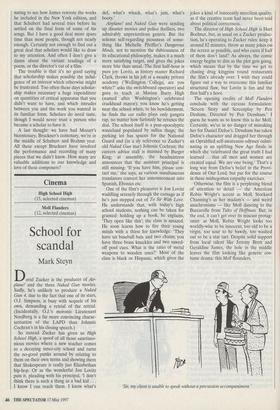Cinema
High School High (15, selected cinemas) Moll Flanders (12, selected cinemas)
School for scandal
Mark Steyn
David Zucker is the producer of Air- plane! and the three Naked Gun movies. Sadly, he's unlikely to produce a Naked Gun 4, due to the fact that one of its stars, O.J. Simpson, is busy with sequels of his own, demanding a retrial of the retrial. (Incidentally, O.J.'s moronic Lieutenant Nordberg is a far more convincing charac- terisation of the LAPD than Johnnie Cochran's in his closing speech.) So instead Zucker has given us High School High, a spoof of all those sanctimo- nious movies where a new teacher comes to a decaying inner-city school and turns the no-good punks around by relating to them on their own terms and showing them that Shakespeare is really just Elizabethan hip-hop. Or as the wonderful Jon Lovitz puts it, pleading with his principal, 'I don't think there is such a thing as a bad kid . . . I know I can reach them. I know what's def, what's whack, what's jam, what's booty.'
Airplane! and Naked Gun were sending up disaster movies and police thrillers, two admirably unpretentious genres. But the solemn self-regarding piousness of some- thing like Michelle Pfeiffer's Dangerous Minds, not to mention the dubiousness of its educational philosophy, makes it a much more satisfying target, and gives the jokes more bite than usual. The first half-hour is pure joy: Lovitz, as history master Richard Clark, throws in his job at a swanky private academy ('Wellington College, are you white?' asks the switchboard operator) and goes to teach at Marion Barry High (named after Washington's celebrated crackhead mayor); you know he's getting near the school when, to his bewilderment, he finds the car radio plays only gangsta rap, no matter how furiously he retunes the dial. The school itself is a post-apocalyptic wasteland populated by sullen thugs; the parking lot has spaces for the National Guard and (in a sly reference to Zucker's old Naked Gun star) Johnnie Cochran; the careers advice stall is manned by Burger King; at assembly, the headmistress announces that the assistant principal is still missing: If you have him, please con- tact me,' she says, as various simultaneous translators convert her announcement into Spanish, Ebonics etc.
One of the film's pleasures is Jon Lovitz waddling serenely through the carnage as if he's just stepped out of To Sir With Love. He understands that, with today's high school students, nothing can be taken for granted: holding up a book, he explains, `They open like this'; the class is amazed. He soon learns how to fire their young minds with a thirst for knowledge: 'They have six baseball bats and two chains; you have three brass knuckles and two sawed- off pool cues. What is the ratio of metal weapons to wooden ones?' Most of the class is black or Hispanic, which gives the jokes a kind of innocently merciless quality, as if the creative team had never been told about political correctness.
The director of High School High is Hart Bochner, but, as usual on a Zucker produc- tion, he's operating to Zucker rules: keep it around 82 minutes, throw as many jokes on• the screen as possible, and who cares if half of them don't land? As always, the comic energy begins to dim as the plot gets going, which means that by the time we get to chasing drug kingpins round restaurants the film's already over. I wish they could figure out a way to overcome this familiar structural flaw, but Lovitz is fun and the first half's a hoot.
The opening credits of Moll Flanders conclude with the curious formulation: `Screen Story and Screenplay by Pen Desham, Directed by Pen Densham.' I guess he wants us to know this is his Moll. Certainly, we're in no danger of mistaking her for Daniel Defoe's. Densham has taken Defoe's character and dragged her through an Oprahfied self-awareness odyssey culmi- nating in an uplifting New Age finale in which she 'celebrated the great truth I had learned ... that all men and women are created equal. We are one being.' That's a long way from Defoe's belief in the Provi- dence of Our Lord, but par for the course in these misbegotten empathy exercises.
Otherwise, the film is a perplexing blend of attention to detail — the American Robin Wright's accent as Moll, Stockard Channing's as her madam's — and weird anachronisms — like Moll dancing to the Barcarolle from Tales of Hoffman. But, in the end, it can't get over its miscast protag- onist: as Moll, Robin Wright looks too worldly-wise to be innocent, too old to be a virgin, too sour to be bawdy, too washed out to be a star tart. Despite solid support from local talent like Jeremy Brett and Geraldine James, the hole in the middle leaves the film looking like generic cos- tume drama: this Moll flounders.
`Sir, my client is unable to speak without a percussion accompaniment.'


































































 Previous page
Previous page